The Chemex has been a crowd favorite for producing a clear and clean cup of coffee. Many single-origin lovers prefer using a Chemex to compliment the more bright and fruity tones found in many single-origin coffees. But whether you’re a home brewer or a professional barista, it’s good to know which filter will give you the cup of clean coffee you most desire.
The metal filter for the Chemex seems to be the best choice. It is a reusable filter with easy clean-up and produces rich, full-bodied, and balanced tastes. Paper filers are suitable for use when trying to simplify the flavors of your coffee, and cloth filters are better for a medium-bodied profile.
The filter you use to prepare your coffee can have a massive effect on your coffee taste and the rest of your coffee drinking and brewing experience. Depending on the flavors you want from your coffee, your outlook on the environment, and your willingness to clean up after a fresh brew, there are many different filters to choose from when brewing coffee using a Chemex.
Disclaimer: Hi! this post may contain affiliate links which will take you to online retailers that sell products and services. If you click on one and buy something, I may earn a commission, see my Affiliate Disclosure for more details.
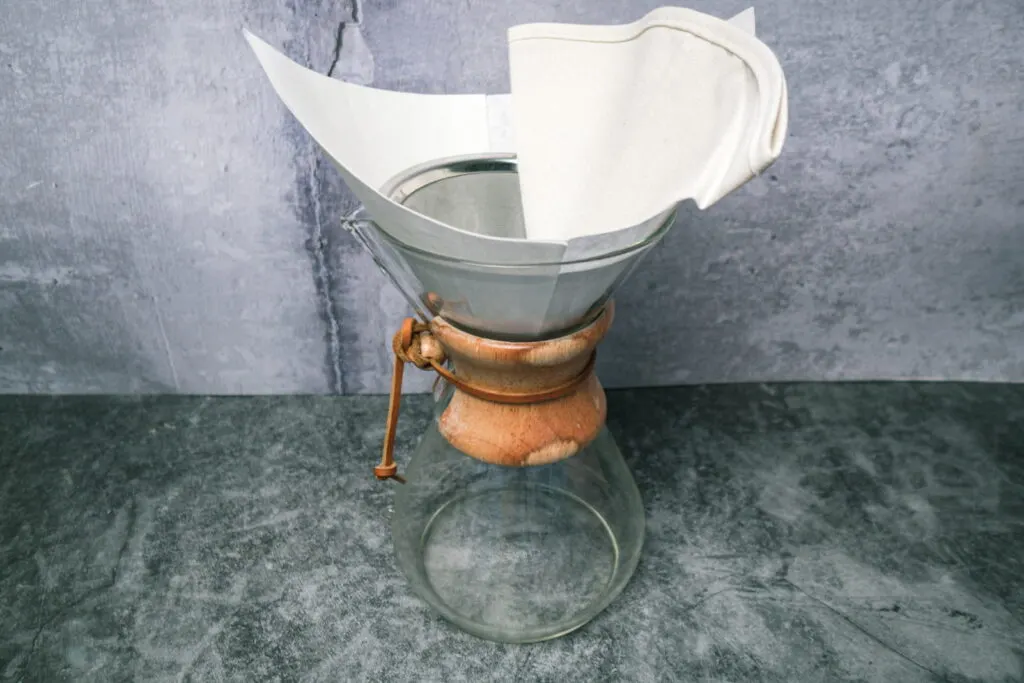
Chemex Filters: Aroma
If you’re a coffee-lover, you’ll know how vital an aromatic presence in your coffee is. The filter you use can significantly affect the aroma of your coffee by limiting the number of aromatic oils that fill your cup after you have brewed your coffee.
Paper Filter
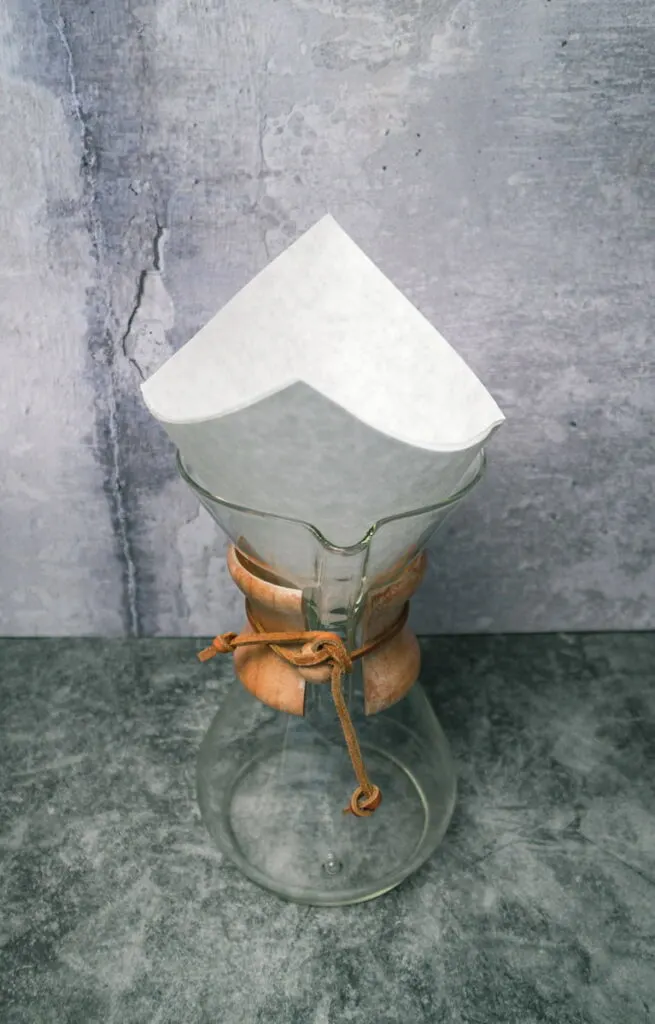
Paper filters are one of the most popular filters for brewing your coffee. When you think of making a pour-over cup of coffee, chances are you see a paper filter in a brewing pot and not a metal or cloth filter.
In the way that coffee is made today, a filter as absorbent and restricting as a paper filter is not always the best option to choose when you are making an expensive or highly complex pot of coffee.
The paper filter is known for removing many things from a pot of coffee during the brewing method. One of the things that a paper filter is good at removing is the aromatic oils found in coffee beans. Because of how much a paper filter removes, it is considered the wrong choice if you are looking for an aromatic experience
Cloth Filter
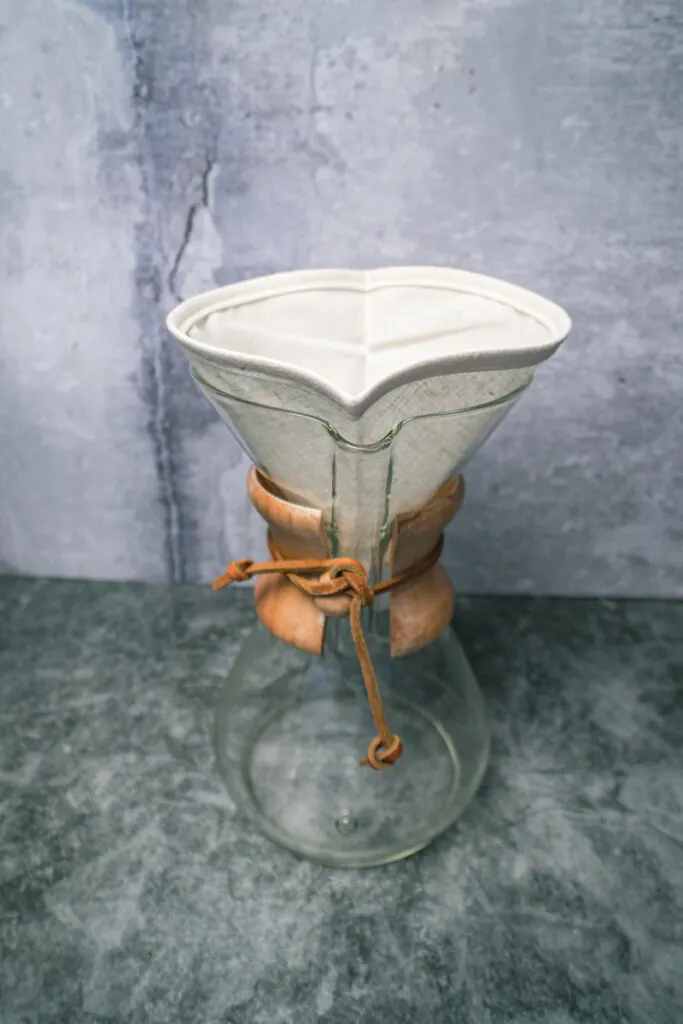
Using a cloth filter to brew a fresh pot of coffee can be either a great or terrible experience depending on your expectations.
Cloth filters, being made from tightly woven cloth, allow you to brew a cup of coffee that is free from even the smallest of micro-grinds. Surprisingly though, if you are looking for an aromatic cup of coffee, this might be one of your best options. Cloth filters are made to minimize the absorption of aromatic oils.
Metal Filter
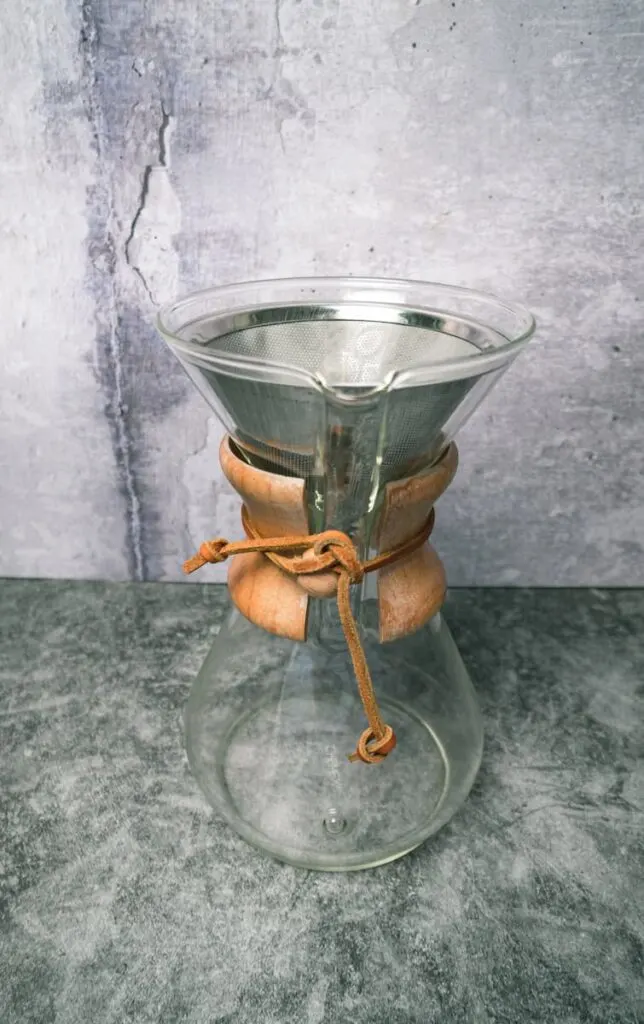
Metal filters are the best choice for use if you are looking for an aromatic cup of coffee.
Since there is no cloth or paper used in metal filters, some micro grinds come through into your brewing pot. However, micro grinds make barely any difference in texture and mean that all the aromatic flavors that contribute to “blueberry” and other fruity or complex flavors are also present in your cup.
Chemex Filters: Flavor Profile
When you are looking to brew the perfect cup of coffee, little matters to you as much as the flavor profile that you are expecting to taste. Finding a filter that keeps grinds out of your cup but still allows maximum flavor is an absolute must for any coffee enthusiast.
Paper Filter
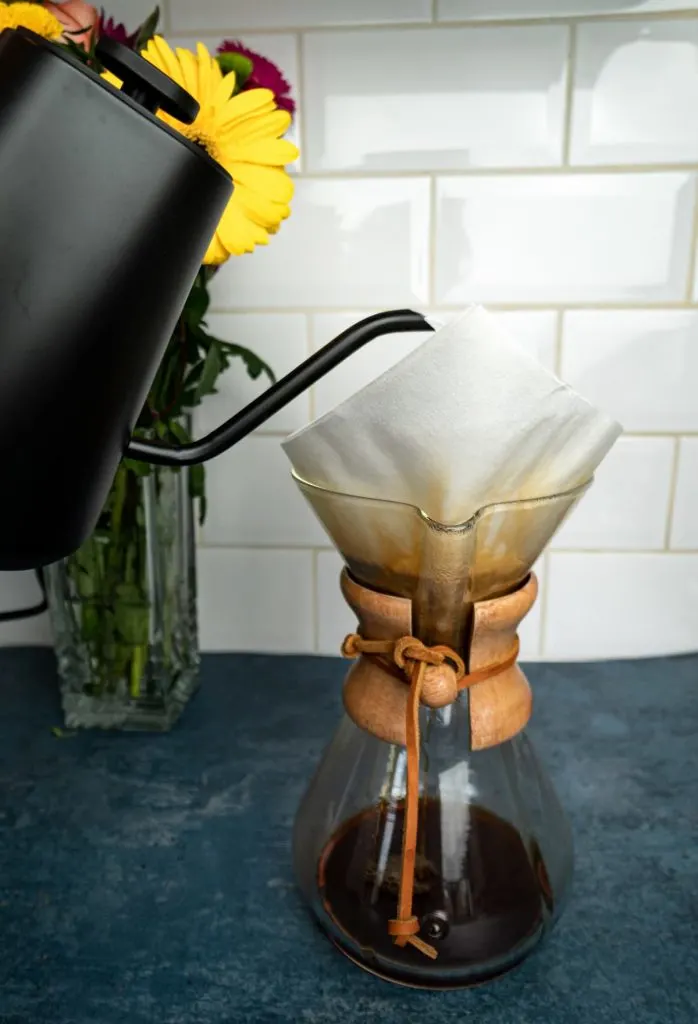
When you brew coffee using a Chemex with a paper filter, you would probably want the complex flavor that a Chemex is known for allowing.
However, paper filters are absorbent and very restricting with what it allows through into the brew pot. If you are looking for light-bodied and crisp flavors, paper filters will probably be your first choice.
Because paper filters keep so much extra from reaching your cup, paper filters have been used to simplify the taste of coffee while simultaneously giving you less of a “full-bodied” feel. Paper filters are seen as the best for achieving bright and clean cups of coffee with seemingly higher notes of acidity.
Cloth Filter
Brewing with a cloth filter ensures that you will have a cup free of sediment but full of natural oils and aromas. Cloth filters are a middle ground between metal and paper filters because the coffee brewed while using a cloth filter is usually more aromatic and medium-bodied.
Cloth filters still restrict most parts that contribute to complexity and a full-bodied feel, allowing cloth filters to also present a bright and crisp taste associated with high acidic notes.
It is good to remember that the flavor extracted from cloth filters will generally differ between different filters and depends on how often you clean your filter. It is also good practice to replace your cloth filter at least every one hundred brews.
Metal Filter
Metal filters are known for leaving a bit of sediment in the bottom of your cup from time to time. This sediment is not harmful and does not have to dampen your coffee experience. Swirling your coffee for the last sip will ensure extra flavor, but you could also choose not to drink it at all.
Metal filters allow a few micro grounds through the filter and into the brewing pot or cup. The fact that a metal filter allows micro grounds means that not only are the natural oils present, but you will also have a heavier feeling cup of coffee.
Though metal filters do not change the acidity of your coffee, the other flavors, oils, and micro grounds allowed in the cup make it seem that way. The added flavors in the cup allow for a more well-rounded, fruity, and rich flavor. Many coffee enthusiasts prefer a metal filter for brewing single-origin coffees as it is the best way to experience full taste.
Chemex Filter: Reusability
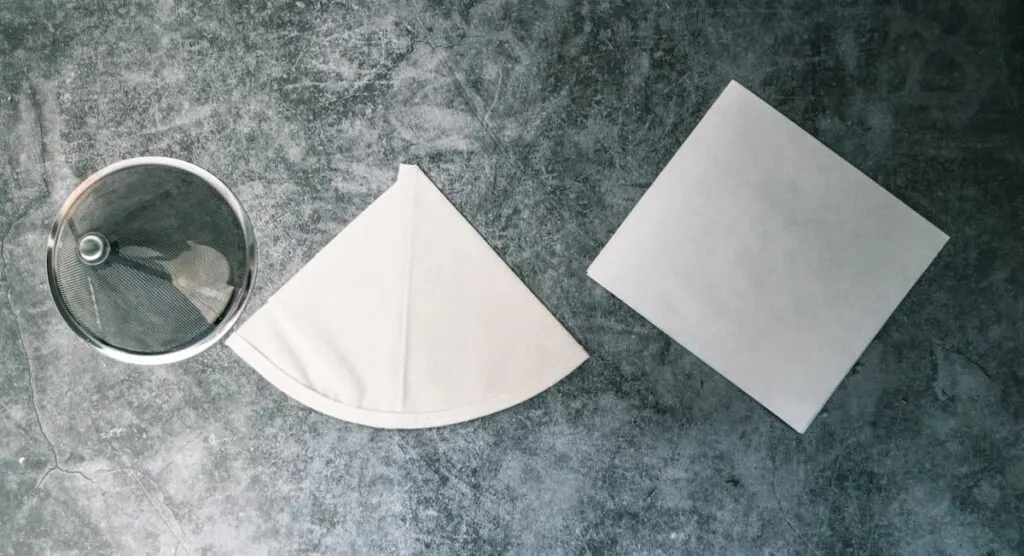
Buying a filter or filters for your coffee dripper like the Chemex can be quite money intensive. That is why there are options to consider when choosing what to buy. Both cloth and metal filters are made for use over more extended periods.
Also, if you are trying to reduce the amount of waste or amount of paper filters you use, a reusable filter might help you.
Paper Filters
Paper filters are made to allow for quick and easy brewing with minimal cleaning times after use.
That does, however, mean that paper filters are not made to be used for more than one brew. Buying a pack or box of filters can become a bit expensive depending on how much coffee you drink, and people have even been known to attempt using the same paper filter twice after taking out much of the old grinds.
Trying to reuse a paper filter is not a good idea and might result in a pot of unbrewed coffee grinds instead of a nicely brewed cup of coffee.
Cloth Filters
Cloth filters, while providing a similar coffee to paper filters, are made to last at least a little longer than paper filters.
There are guidelines for how often you should replace your cloth filter. The consensus is that your cloth filter should be replaced at least once every one hundred uses. Replacing your filter means that your old filter will need to be thrown out, and a new filter will have to be bought.
This estimate is only for brewers who clean their filters and will do so well and regularly. If you do not like cleaning your filters, you might want to replace your filter more often to ensure no bad tastes are pulling through from previous brews.
Metal Filters
Metal filters, as mentioned above, are known for allowing a bit more flavor and coffee through into your brew pot. If this is a deal-breaker to you, a cloth or paper filter is probably the better option for you.
However, along with providing a more rich, bold, and aromatic coffee experience, metal filters will also ensure that you cut down on the costs of buying filters every so often. Metal filters are made to last as long as you use them, and replacing them is rarely needed.
It is, however, good practice to keep an eye on your filter and the condition it is in as some filters might start tearing or rusting after long and often use. Conditional to the amount of coffee you drink and how well you clean and take care of your filter, buying one might be an investment that may last your whole life.
If you are looking to limit your paper waste or cut down on the costs of buying filters regularly, a metal filter might be a good idea for you. It might seem that metal filters are a bit more pricey at the start, but it more than makes up that money with the number of uses you can get from it if it is well looked after and washed.
Chemex Filters: Clean-up
No one likes cleaning up, especially when it comes to coffee grinds. However, cleaning up after a fresh brew is something we must all do, and choosing a filter that you are willing to clean or helps your clean-up is crucial in the overall coffee and brewing experience.
Paper Filters
Out of all three of the filters you can choose from when using a Chemex brewing system, paper filters are probably the easiest and most popular to use for brewing.
When using a paper filter to brew a new pot of coffee, it is as easy as pouring grinds into the filter, brewing the coffee, and throwing the paper filter and ground coffee away. There is very little time spent cleaning your paper filter as it is a one-time-only use, and after it has been used, you simply dispose of it.
The fact that you can simply throw away the filter the second you are done brewing makes it a prime contender for anyone who does not have time to wash and dry a filter. This popularity is especially true in a world where no one has time to waste, and we are taught early on that time is money.
Cloth Filters
If you have the time to clean a cloth filter, it might be as good a contender in the contest for the best filter as the paper filter seeing as the coffee they produce is mostly the same.
Cleaning your cloth filter is a bit more hassle than simply throwing it away. Of course, you will be throwing it away after a while, but if you take good care of the cloth filter you use, it will last you quite a bit of time before you need to start considering disposal.
After brewing your coffee, you can carefully remove the filter and wait to cool and remove the leftover coffee grinds. Next, you’ll want to rinse your cloth filter with lukewarm water to wash away any grounds still left.
After rinsing your filter the first time, it is recommended that you rinse it with warm and soapy water to remove whatever tastes or oils are left in the fabric. After a soapy rinse, make sure to rinse it with lukewarm water again to remove any leftover soap from the filter and hang it up to dry.
Metal Filters
Cleaning a metal filter might seem like a bit of a hassle but is quite simple after some practice.
After brewing, remove the filter and let it cool down. Then remove the coffee grinds left in the filter after the brew. Rinse the metal filter in lukewarm water to remove any leftover grounds.
After all the grounds have been thoroughly removed, you have two choices. Either put the filter in the top rack of your dishwasher or rinse it again using a combination of one-third white vinegar to two-thirds hot water. If you want to deep-clean your filter, you can put it in the water-vinegar mix overnight and rinse it the next day again.
When comparing paper filters, cloth filters, and metal filters, there are many reasons why you might like one more. The best filter is ultimately the one that provides you with the flavor and coffee experience you wish to have. All the filters mentioned above are great for making coffee in their way, and choosing the right one will improve your coffee experience.
